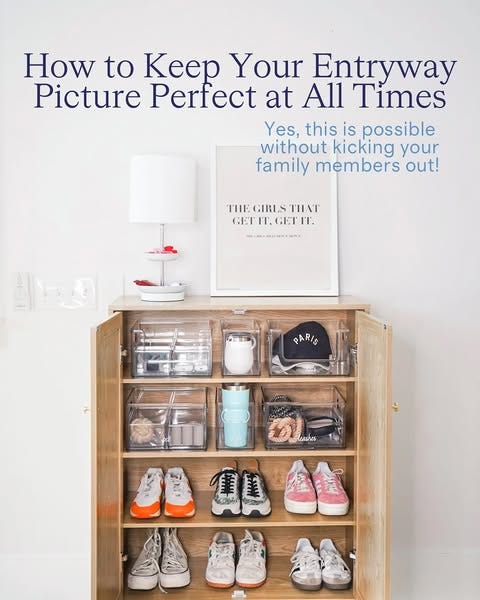In another life, I would be a professional organizer. A neatly arranged cabinet is my own personal Nirvana. I’m such a nerd that when my husband got me a label maker for Christmas last year, I nearly cried because I felt SO SEEN.
But as I eagerly consume home organizing content, I’ve noticed how much consumerism has crept into this space. An activity that’s ostensibly about paring down and simplifying now requires buying hundreds of dollars’ worth of clear plastic bins, matching baskets, and tiny turntables.
This is part of a larger trend of figuring out ways to accommodate more and more stuff. It’s not just a proliferation of plastic bins; it’s the size of our homes. If you consume any HGTV-related content, you’ll see young couples touring adorable hundred-year-old homes, flinging open the closets and *despairing* about how they couldn’t possibly manage with such little storage space. (And yet, people DID and DO!) The modern home buyer is seeking a giant kitchen they’ll rarely entertain in and home theaters that will sit empty 99% of the time.
The last thirty years has seen Americans shifting their lives from public spaces (parks, cafes, restaurants, libraries, theaters) to private ones, to our own detriment. Discussing the work of Princeton sociologist, Patrick Sharkey, Derek Thompson writes in The Atlantic:
“From 1973 to 2023, the size of the average new single-family house increased by 50 percent, and the share of new single-family houses that have air-conditioning doubled, to 98 percent. Streaming services, video-game consoles, and flatscreen TVs make the living room more diverting than any 20th-century theater or arcade. Yet conveniences can indeed be a curse. By Sharkey’s calculations, activities at home were associated with a ‘strong reduction’ in self-reported happiness.”
-“The Antisocial Century” (gift link here)
We have things exactly backwards: we are rich in possessions but poor in community. In thinking our stuff will save us, we entomb ourselves with our possessions like modern-day pharaohs. We reach for hits of easy dopamine (shopping, gaming, scrolling) instead of doing the work of relationship-building. Many of us don’t even know our neighbors’ names.
There is another way. I live in an intentional mixed-income neighborhood: my section of market-rate townhouses is flanked by public housing. One thing I’ve noticed about middle-class parents is how much we struggle for things like childcare. We often can’t rely on family (who either live far away or are still working) to help out. Instead, each individual parent is hustling to get spots in summer camp or after school care. We’re exhausted from constantly driving our kids to and fro.
Meanwhile our poorer neighbors rely on relatives and neighbors to provide childcare. To be sure, this is not a perfect system, and I know that many low-income parents would like more enrichment opportunities for their kids. All the same, I’m amazed at the level of care many of my lower income neighbors show each other. For all the STEM lessons our middle-class kids get, it does make me wonder what we’re not teaching them about kinship, care, and community.
What would it look like to invest less in our own homes and own belongings and more in our community? What benefits would we reap from being able to rely on each other?
As I was thinking about this, a quote from
came to mind. In writing about our current political situation, she says:“Now is not the time to hunker down and hoard, as tempting as it might seem. Now is the time to dig deep, finding the courage to recognize our kinship and build new kinds of communities together.”
(You can read the whole post here)
So this month I want to try a little experiment. Call it “Spring Cleaning: Heretic Version.” I want to give away my excess instead of hoarding it. I want to reorient myself from hoarding to investing in my community.
This month I will aim to:
give away one item every day
reexamine my charitable giving
indulge in wild generosity: extravagant tips! Random donations! Helping others!
think deeply about consumption, community spaces, the costs and benefits of living in public rather than private
What questions do you have about generosity and/or investing in community? Any resources or tips for me? Do you need a favor? What’s your favorite home organizing show? As always, I’d love to hear your thoughts in the comments.
BONUS MATERIALS:
I enjoyed
’ take on new romanticismthis parody is what I think Mark Zuckerberg’s closet is actually like






We recently converted our garage to more hangout space, which meant displacing everything we stored in there. It been a long, 10-12 year process of sorting and purging, mostly forced by repeated downsizing. This last bit we’ve done has enraged me at times as I find items that were lost so we purchased it again, and now we have two. Or we ordered something that we ended up not needing. And now we’re stuck trying to get rid of all this crap, and it all seems so unnecessary.
I’m trying to be patient with myself, though, now that I’ve learned more about the impulsivity of ADHD that Bryan and I both struggle with. These days we’re better about pausing and checking in with each other before buying something to make sure we really need it.
Here’s to anti-hoarding and giving away something every day— challenge accepted! (Does my grown kids’ stuff count?). And my turn to thank you for the shout out!